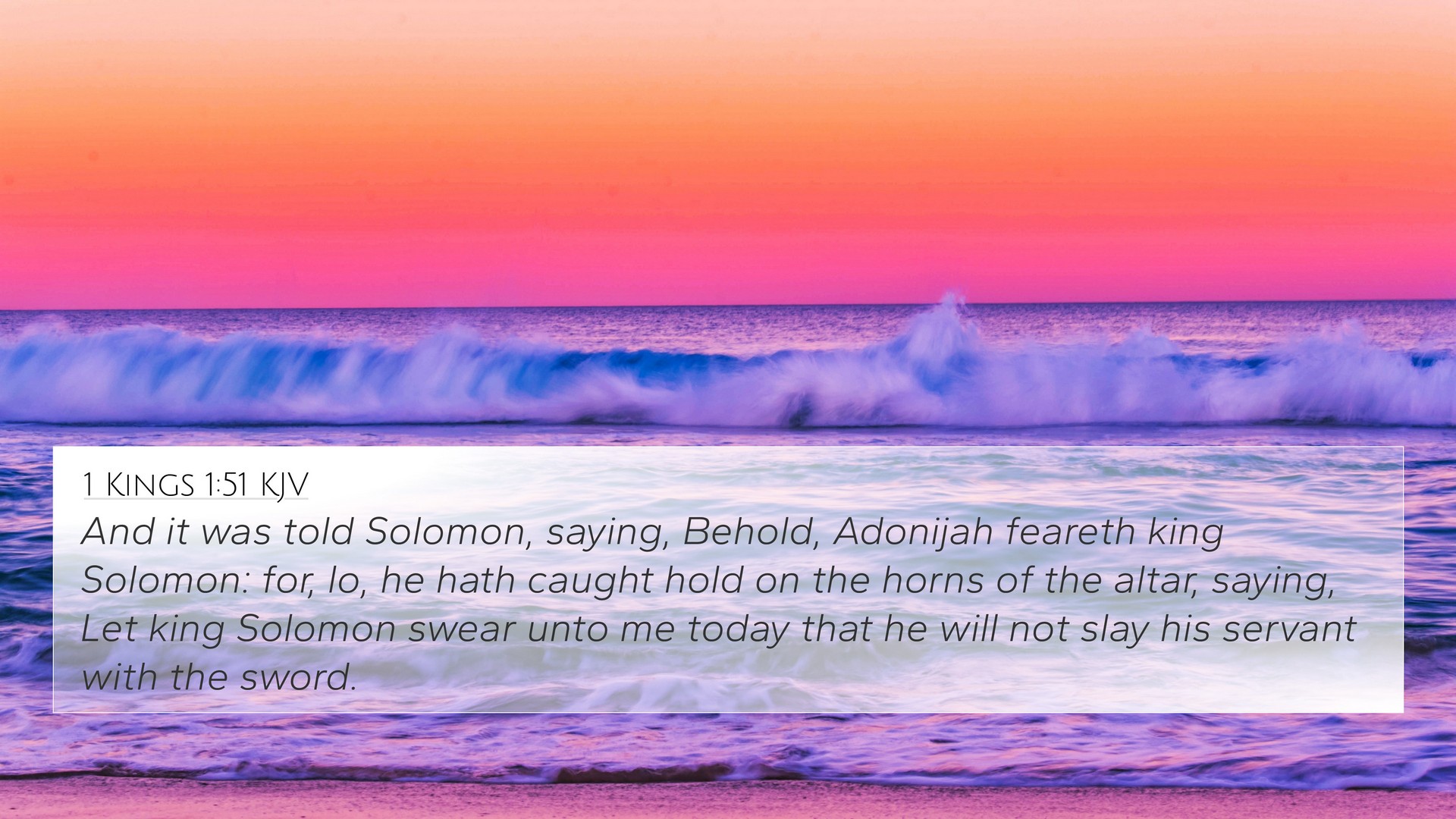Understanding 1 Kings 1:51
1 Kings 1:51: "And it was told Solomon, saying, Behold, Adonijah feareth King Solomon: for, lo, he hath caught hold on the horns of the altar, saying, Let King Solomon swear unto me today that he will not slay his servant with the sword."
Summary of the Verse
The verse depicts a moment of fear and desperation from Adonijah, the son of David, who seeks clemency from Solomon. Holding onto the horns of the altar symbolizes a plea for mercy and indicates a deep-seated fear of retribution. This moment is pivotal in the transition of power from David to Solomon and highlights themes of mercy, justice, and the political intrigue of the times.
Commentary Insights
Matthew Henry's Commentary: Henry explains that Adonijah's act of grasping the horns of the altar exemplifies a common practice during ancient times to seek refuge and mercy from the rightful king. This reflects his awareness of his own peril and desperation for forgiveness after attempting to usurp Solomon's claim to the throne.
Albert Barnes' Notes: Barnes emphasizes the significance of the altar and its horns, referring to them as places of sanctuary. Adonijah's actions show his acknowledgment of Solomon's authority and his recognition of the consequences of his earlier actions. The act of seeking an oath is characteristic of his understanding of covenant relationships.
Adam Clarke's Commentary: Clarke further elaborates on the implications of Adonijah's fear, pointing out that it reveals both his guilty conscience and the politically charged atmosphere of Solomon's ascension. Clarke notes that the act serves as a dramatic moment that highlights the lengths one will go to for safety when power dynamics shift.
Bible Verse Cross-References
- Exodus 21:14: "But if a man come presumptuously upon his neighbor, to slay him with guile; thou shalt take him from mine altar, that he may die." (Reinforces the significance of the altar as a place of mercy)
- 1 Kings 2:28-34: The conclusion of Adonijah’s story and Solomon’s response to his plea for mercy.
- Psalm 118:27: "God is the LORD, which hath shewed us light: bind the sacrifice with cords, even unto the horns of the altar." (Symbolizes commitment and mercy)
- Hebrews 6:18: "That by two immutable things, in which it was impossible for God to lie, we might have a strong consolation, who have fled for refuge to lay hold upon the hope set before us." (Similar themes of seeking refuge)
- Proverbs 28:13: "He that covereth his sins shall not prosper: but whoso confesseth and forsaketh them shall have mercy." (Relates to Adonijah’s desire for mercy)
- 1 Samuel 31:4: The concept of seeking mercy at the time of fear or impending doom, which was common in biblical narratives.
- Luke 1:50: "And his mercy is on them that fear him from generation to generation." ( connects divine mercy with human fear)
- Romans 12:19: "Dearly beloved, avenge not yourselves, but rather give place unto wrath: for it is written, Vengeance is mine; I will repay, saith the Lord." (The idea of leaving vengeance to God ties back to the themes in 1 Kings)
- Deuteronomy 19:4-6: Establishes laws regarding cities of refuge which parallels the asylum sought at the altar
Thematic Connections
This verse presents notable themes that reverberate throughout Scripture. The concepts of mercy and justice, the significance of seeking refuge, and the dynamics of power and fear are interwoven in this narrative.
By analyzing 1 Kings 1:51 alongside these cross-references, individuals can see a pattern in how the Bible synchronizes themes through different narratives, providing a comprehensive understanding of God's principles of mercy for humanity.
Tools for Bible Cross-Referencing
For those interested in exploring the connections between biblical texts, there are several tools and methods available:
- Bible Concordance: A useful resource for finding related verses and understanding themes.
- Bible Cross-Reference Guide: Provides insight into how different verses connect linguistically and thematically.
- Cross-Reference Bible Study: Methods to determine relationships between scriptural texts.
- Bible Cross-Reference System: A structured approach to identifying relationships across books.
Performing Comparative Bible Verse Analysis
For a deeper understanding of 1 Kings 1:51, believers can engage in comparative Bible verse analysis by:
- Examining similar narratives from the Old Testament, such as David’s repentance (2 Samuel 12).
- Studying New Testament verses reflecting mercy and justice, like those in the Gospels.
- Identifying contrasts in leadership styles between figures such as Solomon and Saul.
Conclusion
The moment captured in 1 Kings 1:51 serves as a dramatic reminder of vulnerability in the face of power. Through the rich layers of commentary and extensive cross-referencing, one can appreciate the complexities of divine mercy, human fear, and the political landscape of biblical times. Understanding these connections promotes a more profound engagement with Scripture, inviting believers to explore the intricate tapestry of God’s word.


